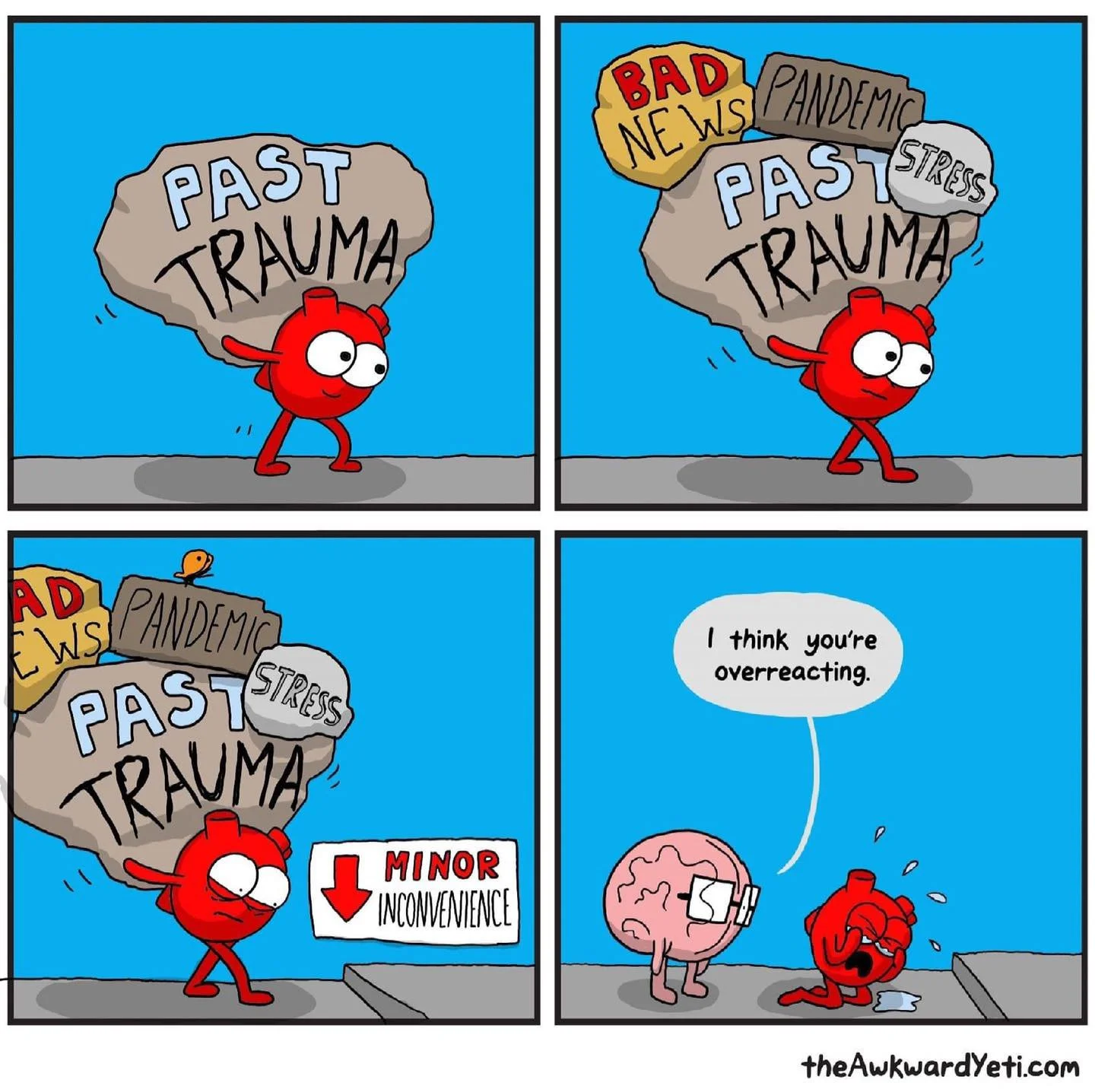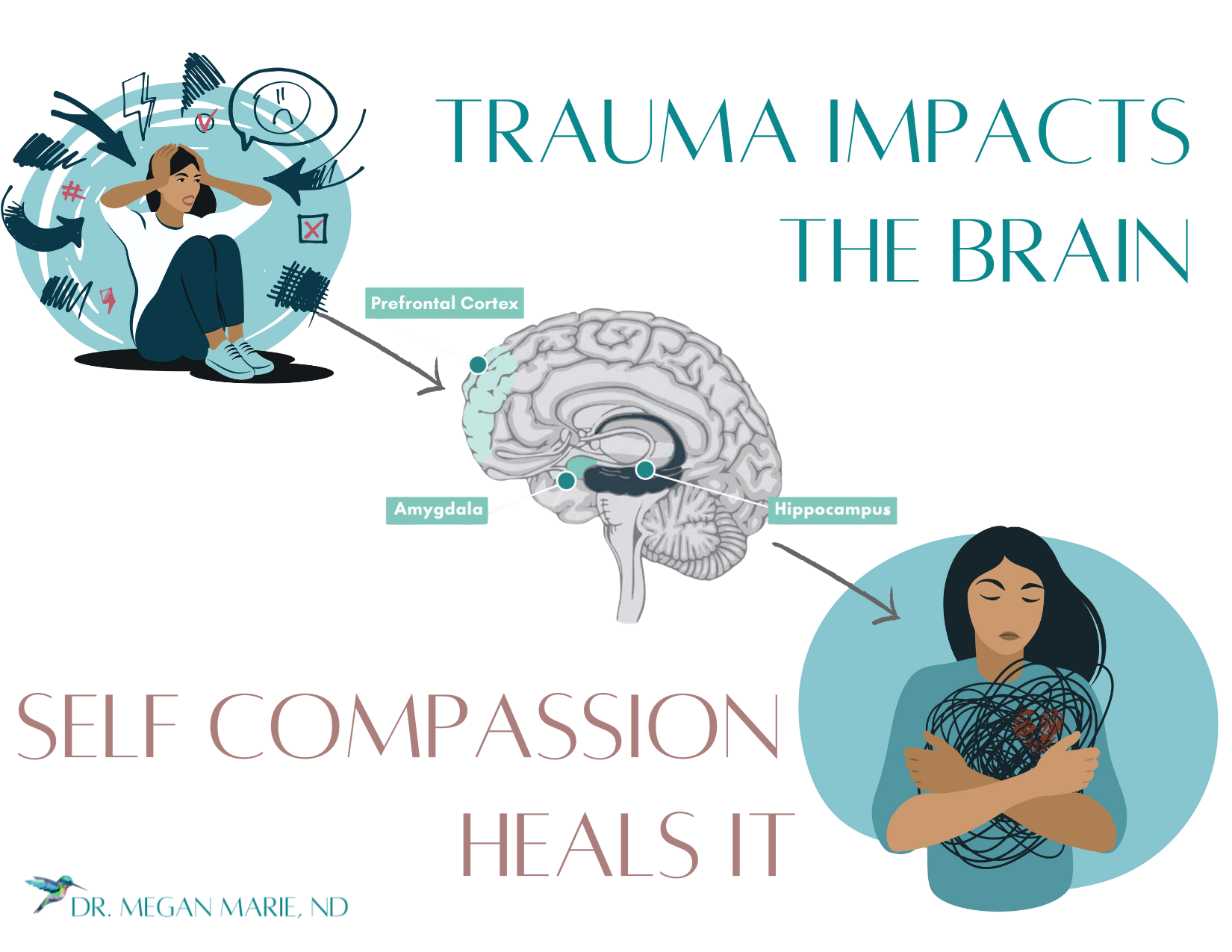How Trauma Impacts the Brain: Reclaiming Sovereignty with Self-Compassion
Trauma touches everyone in some way. It might come from a single, defining event or a series of smaller, insidious experiences that shape how we perceive and interact with the world. At its core, trauma isn’t just something that happens to us—it’s something that imprints itself on our brains, changing how we think, feel, and even move. The good news? What is learned can be unlearned and upgraded. By understanding how trauma impacts the brain and embracing tools like boundaries, nutrients, and self-compassion, we can begin to heal and reclaim our sovereignty.
EARLY CONDITIONING: THE FOUNDATIONS OF OUR RESPONSES
Our earliest experiences shape our brains like a sculptor molding clay. These formative years teach us how to respond to stress, danger, and even love. For some, these lessons create a safe and resilient foundation. For others, they set the stage for hypervigilance, self-doubt, or fear.
When a child grows up in an environment of criticism or unpredictability, their brain often learns to prioritize survival over exploration or joy. These conditioned responses become automatic, shaping how they view the world and themselves. The hopeful part? Our brains are malleable. What has been learned through early conditioning can also be unlearned and transformed.
HOW TRAUMA HIJACKS THE BRAIN
The brain’s fight-or-flight system, anchored in the amygdala, is designed to protect us. But when trauma enters the picture, this alarm system can go into overdrive. In moments of perceived danger, the amygdala takes control, silencing the frontal cortex—the part of the brain responsible for rational thought and decision-making. This is why it’s so hard to think clearly or stay calm in the face of triggers.
Trauma doesn’t just affect thoughts—it impacts the entire nervous system. Anxiety and fear disrupt the body’s ability to communicate effectively. This interference in nervous conduction can lead to clumsiness, brain fog, or a general feeling of being “disconnected.” These are not signs of failure but rather the brain’s way of managing an overwhelming load.
RECLAIMING SOVEREIGNTY THROUGH AWARENESS AND TOOLS
Healing begins with awareness. Recognizing that many of our reactions are learned can empower us to rewrite these scripts. By setting boundaries, nourishing the body with the right nutrients, and using practical tools, we can support the brain’s natural capacity to heal.
SETTING AND REINFORCING BOUNDARIES
Drawing from Rev. Meg’s Boundaries Workshop, boundaries are more than saying “no.” They are a declaration of what you value and how you protect it. Each time you honor your boundaries, you teach your brain that it is safe and worthy of care. This act of self-protection rewires old pathways of self-neglect and fear.
NUTRIENTS AND HERBS FOR MENTAL RESILIENCE
We know that our mental health is deeply connected to our physical health. Nutrients like magnesium, B-complex vitamins, and omega-3 fatty acids support brain function by aiding in the production of neurotransmitters like serotonin and dopamine. Quality protein sources provide amino acids, the building blocks for these essential neurotransmitters (not to mention immune cells), helping to stabilize mood, enhance cognitive clarity, and keep us healthy.
Magnesium: Supports relaxation and stress reduction. Optimal dosage: 300-400 mg/day. (Glycinate for sleep or citrate for constipation relief).
B-complex Vitamins: Enhance neurotransmitter synthesis and energy production. Look for a balanced B-complex that has folate (B9) in the form of 5-methyltetrahydrofolate.
Omega-3 Fatty Acids: Reduce inflammation and support brain cell membranes. Dosage: 1-2 grams/day of EPA and DHA.
Ashwagandha: An adaptogen that calms the nervous system. Dosage: 300-600 mg/day.
Lavender: Reduces anxiety and promotes sleep. Dosage: 80 mg/day (standardized oil).
PRACTICAL SELF-COMPASSION
Self-compassion is the bridge between understanding trauma and healing from it. It invites us to treat ourselves with the same kindness we would offer a dear friend. Here are some ways to integrate self-compassion into your journey:
Journaling or Mindfulness: Journaling helps us slow down our thoughts so we can see them, question them, and reconfigure them to ones that support us rather than hurt (or gaslight) us.
Affirmations and Mantras: Affirmations are "positive brainwashing." They crowd out "ANTs" (automatic negative thoughts) and propaganda with revolutionary thoughts of self-love. Vive la revolution!
Gentle Movement: Activities like yoga or craniosacral therapy can help release stored tension and recalibrate the nervous system.
ACTIONABLE TIPS TO BEGIN YOUR HEALING JOURNEY
Pause and Reflect: It’s not always possible to pause and reflect until we’ve done some of the self-compassion practices, but practice makes master. You can train your brain and eventually develop this skill of asking yourself if your reaction serves your current reality or if it’s rooted in past conditioning.
Ground Yourself: Taking big inhales and letting out big exhales slowly at least three times can make a big difference by supporting the vagus nerve, which calms the nervous system.
Nourish Your Brain: Slow carbs, like whole grains and squashes, provide sustained energy and stabilize blood sugar, reducing stress on the body. A Mediterranean diet, rich in whole foods, healthy fats, and low in inflammation, supports overall brain health and mood stability.
A MESSAGE OF HOPE
The brain is incredibly resilient. Through self-awareness, compassion, and practical tools, it is possible to rewrite the story of trauma and step into a place of empowerment. Healing isn’t about erasing the past but about reclaiming your present and future. Every small step you take toward self-care and understanding is a victory.
Remember: What is learned can be unlearned. What has been wounded can be healed. And you have the power to reclaim your sovereignty—one compassionate choice at a time.
What's coming:
Brain Regions and Their Roles in Thought, Mood, and Movement, Part 1
Brain Regions, Part 3: Thalamus, Insula, Corpus Callosum, Brainstem, RAS
The Spinal Cord
How Trauma Impacts the Brain: Reclaiming Sovereignty with Self-Compassion
Craniosacral Therapy - Enhancing Nervous System Balance
Are there specific areas of the nervous system you're curious about? Drop a comment below, and I'll be sure to cover them as we journey through this incredible body-wide network!




